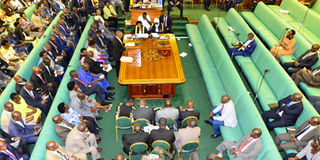Prime
Magyezi tables controversial age limit bill

Igara West MP Raphael Magyezi on the floor of Parliament during the first reading of the age limit bill. PHOTO BY ALEX ESAGALA
What you need to know:
- When this reporter went to the First Parliamentary Counsel (FPC) office in Kampala on Tuesday, a staffer said they have not seen the draft of ‘Raphael Magyezi’s Bill’.
- Ms Kadaga, the Speaker of Parliament, said on Tuesday, during plenary that was boycotted by MPs opposed to the lifting of age limit that since the constitutional amendment bill is important, 'the people (ordinary Ugandans) must be involved in the deliberations'.
Kampala
The constitutional amendment bill that seeks among other issues to scrap the age limit for presidential candidates from the Constitution has been tabled for the First Reading.
The Constitutional Amendment No. 2 Bill, 2017 was tabled by Igara West Member of Parliament Raphael Magyezi.
Mr Magyezi said he secured a Certificate of Financial Implication - from the Ministry of Finance which indicates the funds that are required to institute the proposals in a bill are available.
The Speaker of Parliament, Ms Rebecca Kadaga referred the Bill to the House Committee on Legal and Parliamentary Affairs where it would be scrutinised further.
The Bill also seeks to amend Article 104 (6) to increase from 20 to 60 days the number of days within which the Electoral Commission is required to hold fresh polls if a presidential election is annulled.
It also seeks to provide 15 days, up from 10, after the declaration of presidential election results, within which the results can be challenged.
Opposition, Independent and NRM MPs who are opposed to the lifting of age limit did not attend the Tuesday Sitting, since most of them walked out last week while others were suspended for three Sittings by Speaker Kadaga after a fracas.
The Opposition side was occupied by NRM MPs.
According to a copy of the draft bill, once a petition has been filed, the Supreme Court shall inquire into the case and determine it not later than 45 days from the date it was filed.
And in case the Supreme Court goes ahead to annul the presidential election, the Electoral Commission should conduct a fresh poll within 60 days from the date of the annulment.
In 2016, the Supreme Court, which had heard the Amama Mbabazi v Yoweri Kaguta Museveni & Others presidential election petition No. 2 of 2016, noted that the 10–day period within which to file a presidential election petition was insufficient.
The court also said the 30 days within which it should pronounce itself on the petition is not enough.
Justices of the court recommended reforms, which they said should be instituted within two years (by May 2018).
With the Executive, which should, ordinarily, originate a bill on comprehensive constitutional amendments dragging its feet, Mr Magyezi latched on it and on September 27 sought leave of Parliament to table a Private Member’s Bill to amend Articles 61, 102 (b) and 183 of the Constitution.
The House granted him the leave.
When this reporter went to the First Parliamentary Counsel (FPC) office in Kampala on Tuesday, a staffer said they have not seen the draft of ‘Raphael Magyezi’s Bill’.
Earlier, a clerk at the Uganda Printing and Publishing Corporation (UPPC) Kampala office told this reporter the Government Gazette in their possession runs up to 22 September.
A Clerk at UPPC said they are waiting for the issue for the week that started September 22 - 28 as the one for the week that started on September 29 - October 4, 2017 issue from the FPC.
The first reading, according to a FPC document, marks the formal introduction of a bill in Parliament.
It is during the first reading that the Speaker of Parliament refers the bill to a relevant sessional committee – in this case, the Committee on Legal and Parliamentary Affairs.
It is the committee that then invites the relevant minister to introduce the bill.
The committee also interfaces with other stakeholders to gather their views on the subject matter.
Ms Kadaga, the Speaker of Parliament, said on Tuesday, during plenary that was boycotted by MPs opposed to the lifting of age limit that since the constitutional amendment bill is important, 'the people (ordinary Ugandans) must be involved in the deliberations'.


